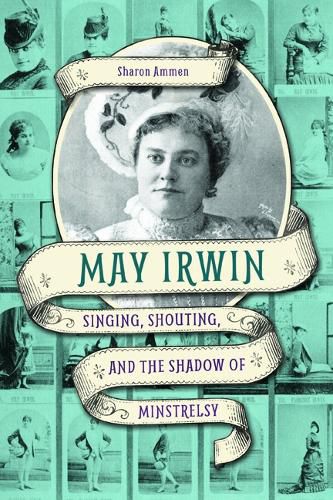Readings Newsletter
Become a Readings Member to make your shopping experience even easier.
Sign in or sign up for free!
You’re not far away from qualifying for FREE standard shipping within Australia
You’ve qualified for FREE standard shipping within Australia
The cart is loading…






May Irwin reigned as America’s queen of comedy and song from the 1880s through the 1920s. A genuine pop culture phenomenon, Irwin conquered the legitimate stage, composed song lyrics, and parlayed her celebrity into success as a cookbook author, suffragette, and real estate mogul. Sharon Ammen’s in-depth study traces Irwin’s hurly-burly life. Irwin gained fame when, layering aspects of minstrelsy over ragtime, she popularized a racist Negro song genre. Ammen examines this forgotten music, the society it both reflected and entertained, and the ways white and black audiences received Irwin’s performances. She also delves into Irwin’s hands-on management of her image and career, revealing how Irwin carefully built a public persona as a nurturing housewife whose maternal skills and performing acumen reinforced one another. Irwin’s act, soaked in racist song and humor, built a fortune she never relinquished. Yet her career’s legacy led to a posthumous obscurity as the nation that once adored her evolved and changed.
$9.00 standard shipping within Australia
FREE standard shipping within Australia for orders over $100.00
Express & International shipping calculated at checkout
May Irwin reigned as America’s queen of comedy and song from the 1880s through the 1920s. A genuine pop culture phenomenon, Irwin conquered the legitimate stage, composed song lyrics, and parlayed her celebrity into success as a cookbook author, suffragette, and real estate mogul. Sharon Ammen’s in-depth study traces Irwin’s hurly-burly life. Irwin gained fame when, layering aspects of minstrelsy over ragtime, she popularized a racist Negro song genre. Ammen examines this forgotten music, the society it both reflected and entertained, and the ways white and black audiences received Irwin’s performances. She also delves into Irwin’s hands-on management of her image and career, revealing how Irwin carefully built a public persona as a nurturing housewife whose maternal skills and performing acumen reinforced one another. Irwin’s act, soaked in racist song and humor, built a fortune she never relinquished. Yet her career’s legacy led to a posthumous obscurity as the nation that once adored her evolved and changed.